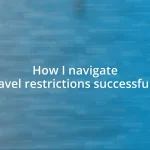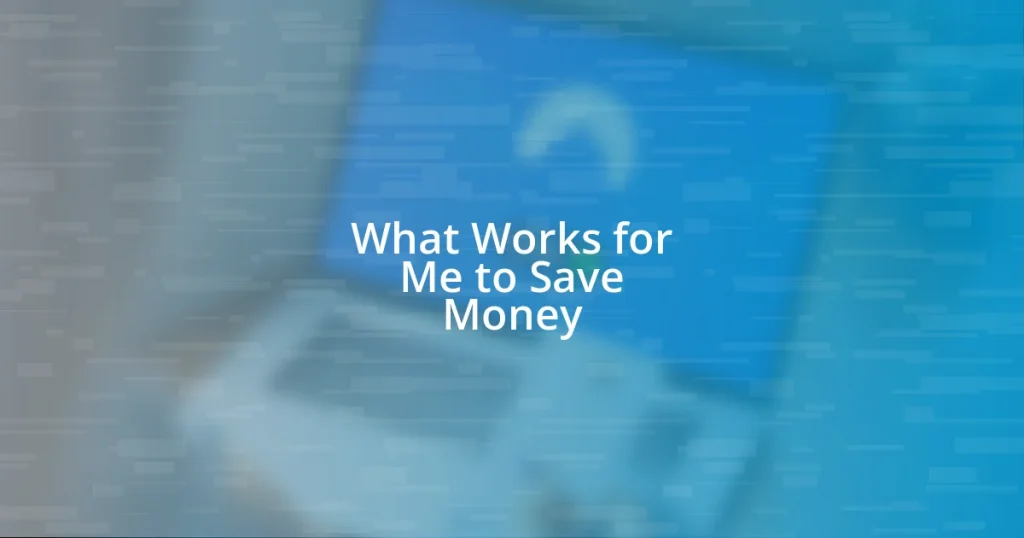Key takeaways:
- Tracking spending and understanding emotional triggers can transform financial habits and promote intentional spending.
- Setting realistic savings goals by breaking them into manageable milestones fosters motivation and adaptability in financial planning.
- Regularly reviewing and adjusting budgets helps identify unnecessary expenses and aligns financial goals with changing lifestyles.
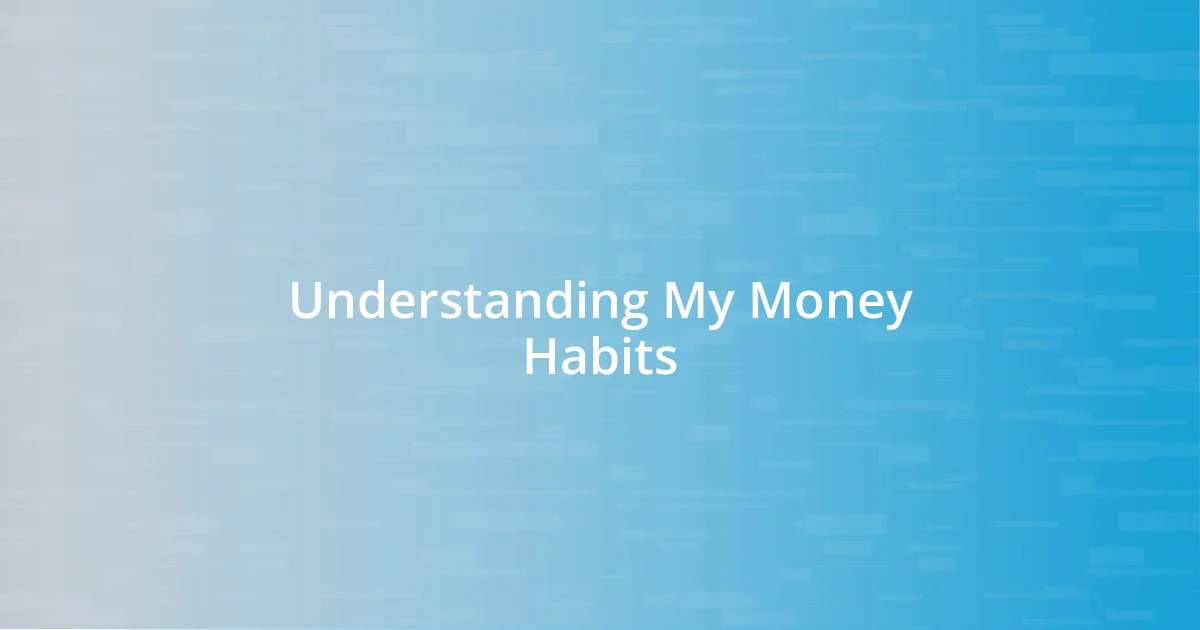
Understanding My Money Habits
Understanding my money habits has been a journey of self-discovery. I remember the first time I tracked my spending for an entire month. It was eye-opening – I realized how often I splurged on little things that added up quietly in the background. Doesn’t it amaze you how those small expenses can sometimes overshadow bigger savings goals?
I’ve also noticed how my emotions tie into my spending habits. When I’m feeling stressed or overwhelmed, I tend to indulge in retail therapy. It’s a temporary fix, of course, but it made me question why I turn to shopping instead of healthier coping mechanisms. Have you ever found yourself making impulse purchases to escape from reality?
Reflecting on my habits revealed patterns that were both surprising and revealing. For example, I learned that I spend less when I create a budget and set clear financial goals for myself. It’s almost like having a roadmap—we all need one, don’t we? Recognizing my triggers and aligning my spending with my values transformed my approach to money management, allowing me to make more intentional choices.
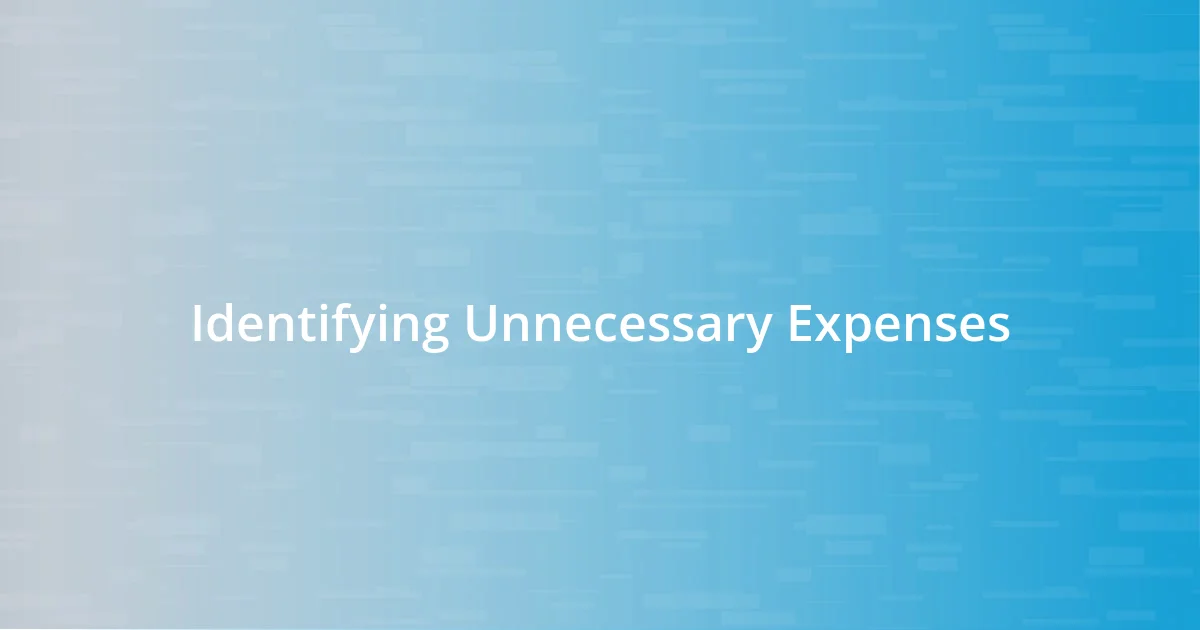
Identifying Unnecessary Expenses
Identifying unnecessary expenses is often about being honest with myself during my financial journey. One day, I realized I was spending money on that daily coffee run, which seemed insignificant at first. But when I calculated the yearly total, it hit me hard—I could fund a small vacation with that cash! This realization prompted me to evaluate similar routine purchases and look critically at my spending.
A few areas that often harbor unnecessary expenses include:
- Subscriptions: Do I really need every streaming service or magazine?
- Dining Out: Eating out can be convenient, but it adds up quickly—could I cook more at home?
- Impulse Buys: I’ve often found that those spontaneous purchases rarely bring lasting happiness.
- Unused Memberships: Those gym memberships can linger long after I stop going—do they really provide value?
- Luxury Items: Reflecting on how often I reach for high-end brands versus more affordable options has shown me a tangible way to save.
By questioning these habitual costs, I’ve not only saved money but also gained a greater understanding of what truly matters to me financially.
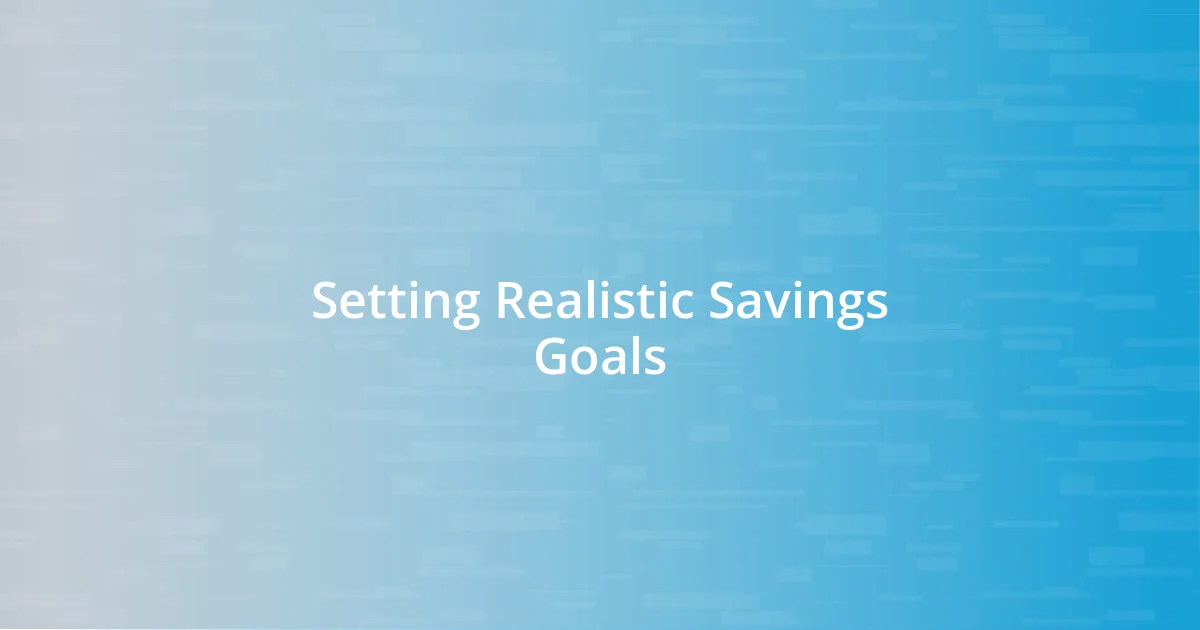
Setting Realistic Savings Goals
Setting realistic savings goals is crucial for anyone looking to enhance their financial health. In my experience, breaking down large goals into smaller, manageable milestones makes the process feel less daunting. For instance, if I want to save for a vacation, I focus on setting aside a small percentage of my income each month. This approach not only makes the goal attainable, but it also provides a sense of accomplishment as I see those savings accumulate over time.
Sometimes, I find it helpful to attach a specific timeline to my goals. For example, when I wanted to buy a new laptop, I calculated how much I needed to save each month to reach that goal by a certain date. This method kept me motivated, especially when I could envision actually owning that laptop after months of dedication. Have you ever noticed how having a deadline can spark a sense of urgency and drive towards your goals?
Setting realistic savings goals also involves being flexible. Life is unpredictable, and sometimes I need to adjust my goals based on unexpected expenses or shifts in my priorities. It’s a learning process, and I’ve learned that it’s okay to tweak my plans. This adaptability contributes to a healthier relationship with my finances, allowing me to navigate challenges without feeling discouraged.
| Type of Goal | Realistic Steps |
|---|---|
| Saving for a Vacation | Save a specific monthly amount; research costs. |
| Buying a New Gadget | Calculate total needed; set a timeline. |
| Emergency Fund | Start small; aim for 3-6 months of expenses. |
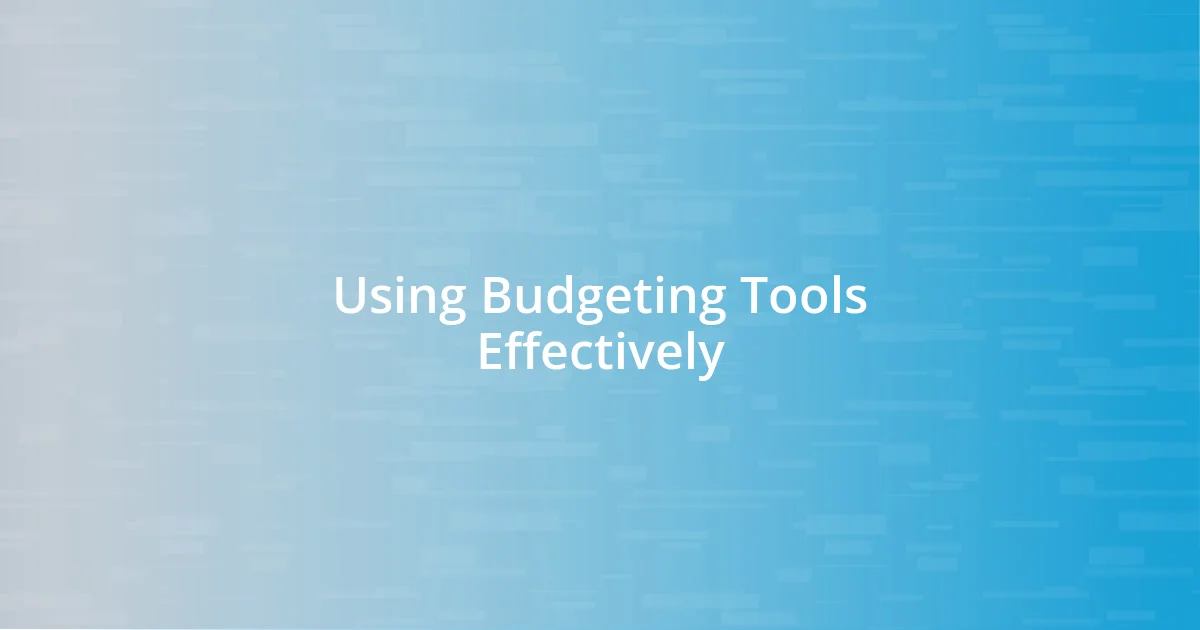
Using Budgeting Tools Effectively
Using budgeting tools effectively has been a game-changer for me on my financial journey. One tool that I’ve particularly enjoyed is the expense tracking app on my phone. It’s fascinating to see where my money goes in real-time—it turns numbers into stories. Have you ever been surprised by an app’s report? I was shocked when my grocery spending outpaced my entertainment budget! This little wake-up call pushed me to make smarter choices while shopping.
I’ve also found that utilizing spreadsheets can take my budgeting to the next level. By creating a simple but detailed monthly plan, I can visualize my income, savings, and spending all in one place. I remember the first month I used one; seeing my goals and actual spending side by side made me feel more in control. It’s empowering to track my progress, and I often find myself celebrating little victories, like sticking to my budget for a whole month. How does it feel to celebrate your own financial wins?
Furthermore, I always make it a point to review my budget at the end of each month. It’s like a financial check-up that keeps me accountable. I jot down what worked, what didn’t, and adjust for the next month. This practice has transformed my relationship with money. I no longer view budgeting as a chore but rather as a proactive approach to financial freedom. If you could tweak one aspect of your budget today, what would it be?
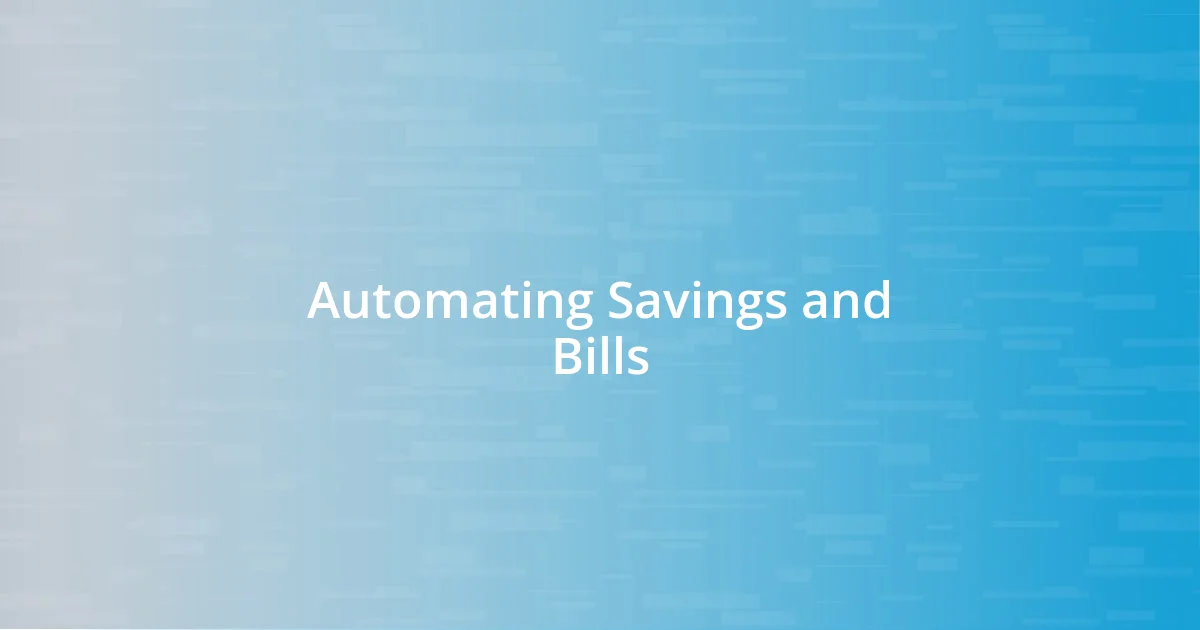
Automating Savings and Bills
Automating my savings and bills has truly simplified my financial life. I remember the relief I felt the first time I set up an automatic transfer from my checking to my savings account each payday. It made saving feel effortless, almost like I was “paying myself” without even thinking about it. Have you ever experienced the peace of mind that comes with knowing your savings are growing on autopilot?
One of the best decisions I made was to automate my bill payments. I was often stressed about due dates, and missing a payment felt like a setback in my financial journey. By scheduling payments, I not only avoided late fees but also freed up mental space to focus on other financial goals. Honestly, it’s like having a weight lifted off my shoulders; I can now concentrate on saving for things I genuinely enjoy, like traveling or upgrading my tech.
Getting started with automation isn’t complicated—most banks and services have user-friendly setups. I still vividly remember setting it up: a few clicks, and I could sit back knowing my chores were handled without constant reminders. It’s almost like having a personal assistant for my finances. If you haven’t tried automating yet, what’s holding you back? It could be the key to unlocking a stress-free financial month.
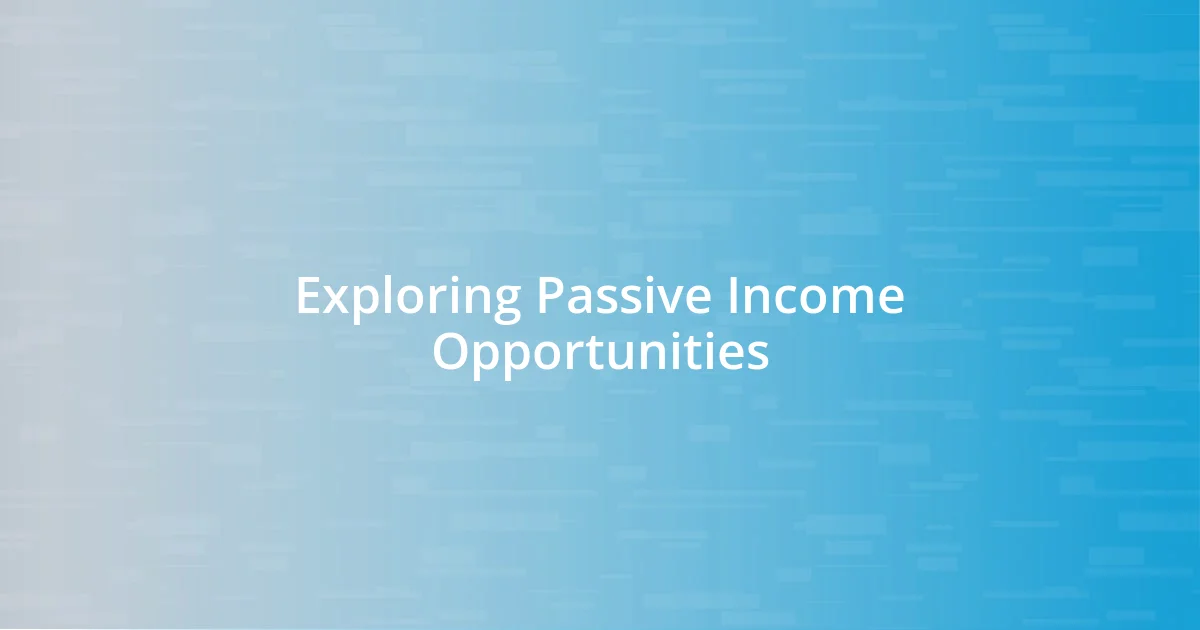
Exploring Passive Income Opportunities
Exploring passive income opportunities has been a rewarding venture for me. One of my earliest experiences was diving into the world of dividend stocks. When I first received that dividend payment, a rush of excitement went through me—it felt like money working for me while I relaxed on the couch! Have you ever considered how satisfying it is to earn money without lifting a finger? I find it incredibly motivating to think of my investments growing silently in the background.
Another path I explored was creating an online course based on my expertise. It was a leap into the unknown, but I remember the thrill of seeing my content resonate with others. Once everything was set up, students enrolled, and the course generated income while I focused on other projects! Have you thought about turning your knowledge into a money-making opportunity? The beauty of it lies in the initial investment of time and effort, which eventually leads to ongoing returns.
Moreover, I’ve dabbled in rental income through sharing my space on platforms like Airbnb. The first time I hosted, it felt surreal to realize that I was making money from something I already owned. Each booking has been a fantastic reminder that being resourceful can pay off. What do you have lying around that could generate income? Sometimes, the best opportunities are right in front of us, waiting for us to take action.
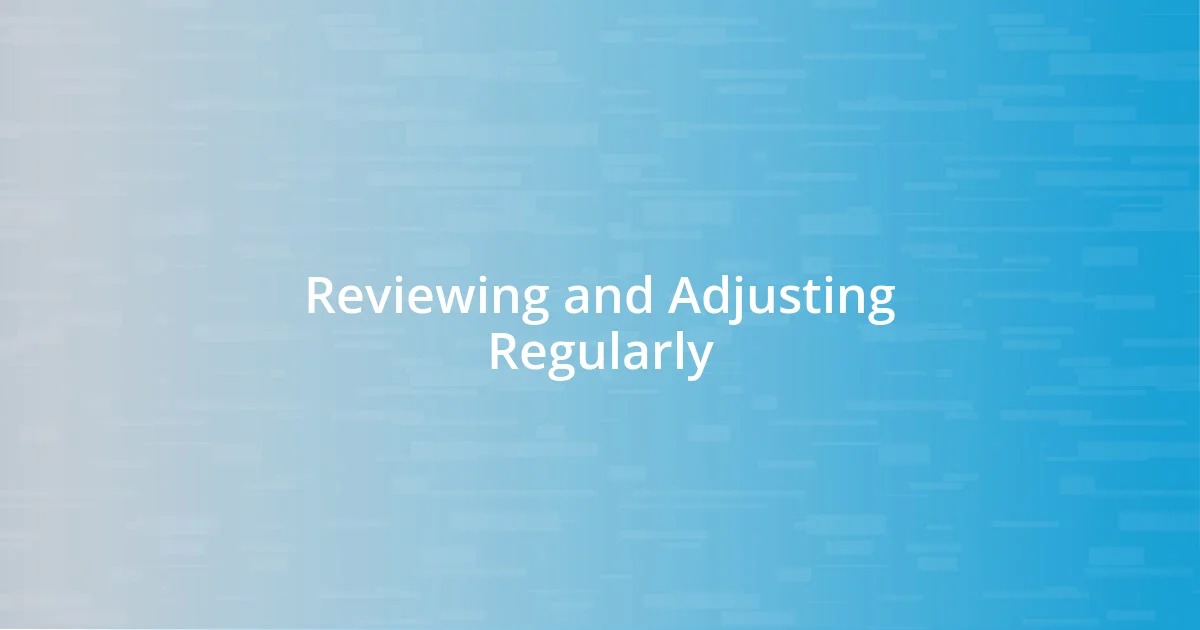
Reviewing and Adjusting Regularly
Reviewing and adjusting my budget regularly has been a game changer. It’s amazing how much can change in just a few months. I remember sitting down one afternoon, cup of coffee in hand, and going through my expenses from the last quarter. I was shocked to find subscriptions I had forgotten about! Have you ever stumbled upon money you didn’t know you were wasting?
Every month, I set aside some time to assess my spending habits, and it’s incredibly eye-opening. I recall making adjustments after realizing my groceries were consistently over budget. By meal planning and sticking to a list, I cut my monthly grocery bill by nearly 30%. That’s money I could redirect toward my savings goals! Isn’t it satisfying to see that kind of immediate impact?
Additionally, I often look at my financial goals to ensure they align with my current lifestyle. There was a period when I wanted to travel more but had set no specific savings for it. Adapting my budget to allocate funds for travel made all the difference. It’s like having a personal scoreboard for my financial journey, which keeps me motivated. Are you regularly revisiting your goals to see if they still resonate with your current priorities? It’s a simple step that makes a big difference in staying on track.








